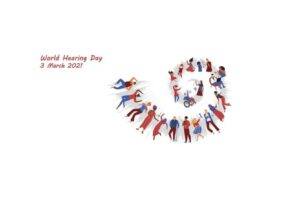World Hearing Day 2021

On 3 March each year, we celebrate World Hearing Day. The WHO’s Office of Prevention of Blindness and Deafness initiated this festival to raise public awareness of deafness and hearing loss prevention and to promote hearing care campaigns across the world. The first World Hearing Report had been launched on the eve of the celebration.
The report shows that by 2050 the number of people with various hearing problems will have risen to over 2.5 billion. Unless effective prevention and treatment measures are taken, at least 700 million will need regular care and hearing rehabilitation. An overwhelming majority of them will live in low or medium-income countries without access to basic medical services.
In most countries, the national health care does not cover otolaryngology or audiology; therefore, access to diagnostics and treatment of ear diseases and hearing disorders is more complicated. However, the biggest issue is the lack of appropriately trained specialists. In low-income countries, around 78% have less than one otorhinolaryngologist per million inhabitants; and 93% – less than one audiologist per million inhabitants. Only 17% of those countries have one or more speech therapists per million inhabitants, and 50% – one or more teachers of the deaf. Even in countries with a relatively high number of hearing specialists, not every patient has easy access to them.
This gap can be minimized by including hearing care into the universal health care and increasing its accessibility by using, among other things, telemedicine tools, which under the conditions of the COVID-19 pandemic evolved from a technological novelty into an essential tool enabling contact with the patient.
– I’m sure that this change will greatly benefit patients, even after the pandemic ends – says Prof. Henryk Skarżyński, founder and director of the World Hearing Centre of the Institute of Physiology and Pathology of Hearing. – This is because there is not and will never be a health care system in the world that will ensure each of us equal access to specialists by traditional means. Bearing that in mind, already 20 years ago, I started to conduct teleconsultations and seek a way to make our hearing treatment services, in particular rehabilitation, as accessible to patients as possible. Already then, telemedicine seemed to be the only way to reduce costs, shorten travel time and distance that the patient had to cover to get to specialists, and at the same time to provide patients with the highest quality services. The situation has improved nowadays because we added to this system e-advice and e-consultations funded by the National Health Fund, provided to patients free of charge. With COVID 19 epidemic, we don’t discuss things but implement them more and more widely, systematically improving our infrastructure and our two telemedicine studios. – adds Prof. H. Skarżyński.
The motto of the International Day of Hearing this year is “Hearing Care for All: Screen, Rehabilitate, Communicate.” Due to the restrictions related to the current pandemic, the celebration will mainly take place online. The organizers hope that this form of communication will especially appeal to young people at whom a significant portion of educational and awareness-raising activities is aimed. Many causes of hearing loss in children and youth can be prevented. The WHO estimates that 60% of hearing loss cases in this group are due to too loud music, especially using earphones.
– Problems related to hearing disorders have become conditions that can often be defined as civilization diseases – emphasizes Prof. H. Skarżyński – Back then, the normal thing was hearing impairment in 70-year-olds. Today, the civilization development, ubiquitous environmental noise, earphones, and loud music from early childhood are shifting this boundary from 70 to 50.
In Poland, the leader among facilities and hospitals specializing in treating various hearing disorders is the Institute of Physiology and Pathology of Hearing, which is celebrating its 25th anniversary this year. The facility has earned a very high position in the country and abroad and has conducted nearly half a million surgical procedures and over 4 million examinations and consultations thus far, with over 10,000 implant users staying under its care. For around 20 years, it has been the world’s number one in terms of the number of procedures performed in the fields of otosurgery, i.e., surgeries to improve hearing. The Institute has carried out numerous national and international projects and pioneer scientific and clinical programs, the results of which have set new standards for treatment in this field of medicine.
The Institute was one of the leading partners of the European Consensus Statement on early detection of hearing disorders in infants as adopted in Milan in 1998 and the main initiator of the signing of the European Consensus Statement on hearing, vision, and speech disorders detection in Warsaw in 2011 during the Polish Presidency of the EU. Later, this proposal was confirmed by the European Council, which adopted it in the form of “Council conclusions on early detection and treatment of communication disorders in children, accounting for the use of e-health tools and innovative solutions.”
It is worth adding that Prof. Henryk Skarżyński and Prof. Piotr Skarżyński are founding members of the World Hearing Forum operating under the auspices of the WHO.